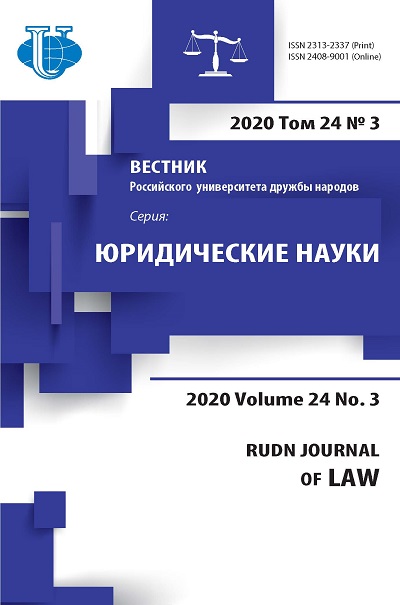СОСТОЯНИЕ ОХРАНЫ ОКРУЖАЮЩЕЙ СРЕДЫ В СТРАНАХ - ЧЛЕНАХ ОРГАНИЗАЦИИ ИСЛАМСКОГО СОТРУДНИЧЕСТВА: ИСТОРИЯ, ПРИНИМАЕМЫЕ МЕРЫ И РЕКОМЕНДАЦИИ ПРАВОЗАЩИТНОГО ХАРАКТЕРА
- Авторы: Бутт М.С.1
-
Учреждения:
- Независимая постоянная комиссия по правам человека Организации исламского сотрудничества (ОИС)
- Выпуск: Том 24, № 3 (2020)
- Страницы: 780-800
- Раздел: МЕЖДУНАРОДНОЕ ПРАВО
- URL: https://journal-vniispk.ru/2618-897X/article/view/327005
- DOI: https://doi.org/10.22363/2313-2337-2020-24-3-780-800
- ID: 327005
Цитировать
Полный текст
Аннотация
Статья посвящена вопросам охраны окружающей среды на универсальном и региональном уровнях. В ней подробно рассматриваются определения, история, причины изменения климата, а также усилия, предпринимаемые международным сообществом по устранению существующих угроз и спасению будущего человечества в рамках достижения устойчивого развития. Автором также рассматривается охрана окружающей среды в правозащитном измерении и предлагаются меры, необходимые для обеспечения поощрения и защиты прав человека в целом и наиболее уязвимых категорий лиц в частности. Особый акцент в статье делается на историю экологического мышления в исламских государствах, на дихотомию исламских заповедей, полностью соответствующих справедливому и устойчивому распределению природных ресурсов, и практикой ряда государств. Не менее важными в этой связи являются различные инициативы, предпринимаемые Организацией исламского сотрудничества (ОИС) для охраны окружающей среды на национальном, региональном и универсальном уровнях. В отношении охраны окружающей среды в странах ОИС в статье рассматриваются подходы к защите права на благоприятную окружающую среду и концепции «климатической справедливости». В свою очередь автор дает ряд рекомендаций странам-членам ОИС с точки зрения проблематики развития и защиты прав человека.
Об авторах
Маргуб Салим Бутт
Независимая постоянная комиссия по правам человека Организации исламского сотрудничества (ОИС)
Автор, ответственный за переписку.
Email: marghoob.butt@gmail.com
дипломат, советник по правам человека Генерального секретаря, а также других органов ОИС, соискатель ученой степени кандидата наук в Российском университете дружбы народов
2550 Халидж Аль Камар, П.О. Box 289 Джидда, 21411, Королевство Саудовская АравияСписок литературы
- Abashidze, A., Solntsev, A., Kiseleva, E., Koneva, A., Kruglov, D. (2016) Achievement of Sustainable Development Goals (2016–2030): International Legal Dimension. Indian Journal of Science and Technology. 9 (37), 1–9.
- Abashidze, A.Kh., Solntsev, A.M., Kolodova, A.V., Kruglov, D.A., Petrova, N.A. (2018) Mezhdunarodnoe ekologicheskoe pravo: dokumenty i kommentarii: uchebnoe posobie [International environmental law: documents and comments: a training manual]. Moscow: RUDN University Publ. (in Russian).
- Abderrahmen, W. (2001) Energy and water in arid developing countries: Saudi Arabia, a case study. International Journal of Water Resources Development. 17 (2), 247–255.
- Aziz, A.A., Mustapha, N.H.N., Ismail, R. (2013) Factors affecting energy demand in developing countries: A dynamic panel analysis. International Journal of Energy Economics and Policy. 3 (S), 1–6.
- Connelly, J., Smith, G. (2003) Politics and the Environment: From Theory to Practice. 2nd ed. London / New York, Routledge.
- Diamond, J. (1987) The Worst Mistake in the History of the Human Race. Discover Magazine, available at: http://discovermagazine.com/1987/may/02-the-worst-mistake-in-the-historyof-the-human-race (Accessed 6 April 2020).
- Diamond-Smith, N., Smith, K.R., Hodoglugil, N.N.S. (2011) Climate change and population in the Muslim world. International Journal of Environmental Studies. 68:1, 1–8.
- Dien, M.I. (1997) Islam and environment: Theory and practice. Journal of Beliefs and Values. 18 (1), 47–57.
- Fabra, A. (2002) The Intersection of Human Rights and Environmental Issues: A Review of Institutional Developments at the International Level. The Joint UNEP-OHCHR Expert Seminar on Human Rights and the Environment.
- Foltz, R. (2000) Is there an Islamic environmentalism? Environmental Ethics. 22 (1), 63–72.
- Foltz, R.C. (2002) Iran’s water crisis: Cultural, political, and ethical dimensions. Journal of Agricultural and Environmental Ethics. 15 (4), 357–380.
- Hancock, J. (2003) Environmental Human Rights: Power, Ethics and Law. Aldershot, Ashgate.
- Handley, M. (2010) The violence in Nigeria: what’s behind the conflict? Available at: http://content.time.com/time/world/article/0,8599,1971010,00.html (Accessed 6 April 2020).
- Hardin, G. (1968) The Tragedy of the Commons. Science. 162 (3859), 1243–1248, available at: https://science.sciencemag.org/content/162/3859/1243 (Accessed 6 April 2020).
- Hay, P. (2002) Main Currents in Western Environmental Thought. Bloomington, Indiana University Press.
- Homer-Dixon, T.F. (2010) Environment, Scarcity, and Violence. New Jersey, Princeton University Press.
- Kiss, A., Shelton, D. (2004) International environmental law. Ardsley, NY, Transnational Publishers.
- Konac, H. (2004) Environmental Issues and Sustainable Development in OIC Countries. Journal of Economic Cooperation. 25 (4), 1–60.
- Kula, E. (2001) Islam and environmental conservation. Environmental Conservation. 28 (1), 1–9.
- Le Page, M. (2016) Was Kyoto climate deal a success? Figures reveal mixed results, available at: https://www.newscientist.com/article/2093579-was-kyoto-climate-deal-a-success-figuresreveal-mixed-results/#ixzz6FcXYl1N8 (Accessed 6 April 2020).
- Martin, A. (2016) Climate change: Figures show Kyoto Protocol was a success — or do they? Available at: https://www.alphr.com/environment/1003699/climate-change-figures-showkyoto-protocol-was-a-success-or-do-they (Accessed 6 April 2020).
- McCormick, J. (1989) The Global Environmental Movement: Reclaiming Paradise. London, Belhaven Press.
- Nash, R.F. (1989). The Rights of Nature: A History of Environmental Ethics. Wisconsin, University of Wisconsin Press.
- Northcott, M. S. (1996) The Environment and Christian Ethics. Cambridge University Press.
- Pepper, D. (1996) Modern environmentalism: An introduction. London, Routledge.
- Rowe, S. (1989) What on Earth Is Environment? The Trumpeter. 6 (4), 123–126, available at: http://www.ecospherics.net/pages/RoWhatEarth.html (Accessed 6 April 2020).
- Saniotis, A. (2012) Muslims and ecology: Fostering Islamic environmental ethics. Contemporary Islam. 6 (2), 155–171.
- Sardar, Z. (1977) Science, Technology and Development in the Muslim World. London, Routledge.
- Sena, L., Woldemichael, K. (2006) Disaster prevention and preparedness. [Lecture notes] Ethiopia Public Health Training Initiative, Jimma University, available at: https://www.cartercenter.org/resources/pdfs/health/ephti/library/lecture_notes/health_scie nce_students/lln_disaster_prev_final.pdf (Accessed 6 April 2020).
- Tabutin, D., Shoumaker, B. (2005) The demography of the Arab world and the Middle East from the 1950s to the 2000s: a survey of changes and a statistical assessment. Population (English edition). 60, 505–615.
- Taylor, P.E. (1998) From Environmental to Ecological Human Rights: A New Dynamic in International Law? Georgetown International Environmental Law Review. 10 (2) 309–397.
- Vincenti, D. (2016) Sustainability transitions in Arab-Islamic countries: Egypt as a case study. Agriculture and agricultural Science Procedia. 8, 135–140.
- White, Jr., L. (1998) The historical roots of our ecological crisis. Environmental Ethics: Readings in Theory and Application. Belmont, Wadsworth Company.
- White, Jr., L., Fishman R.L., Lipeles M.I., Squillace M.S. (eds.) (1996) The Historical Roots of Our Ecologic Crisis in An Environmental Law Anthology. Cincinnati, Ohio, Anderson Publishing Co.
Дополнительные файлы








